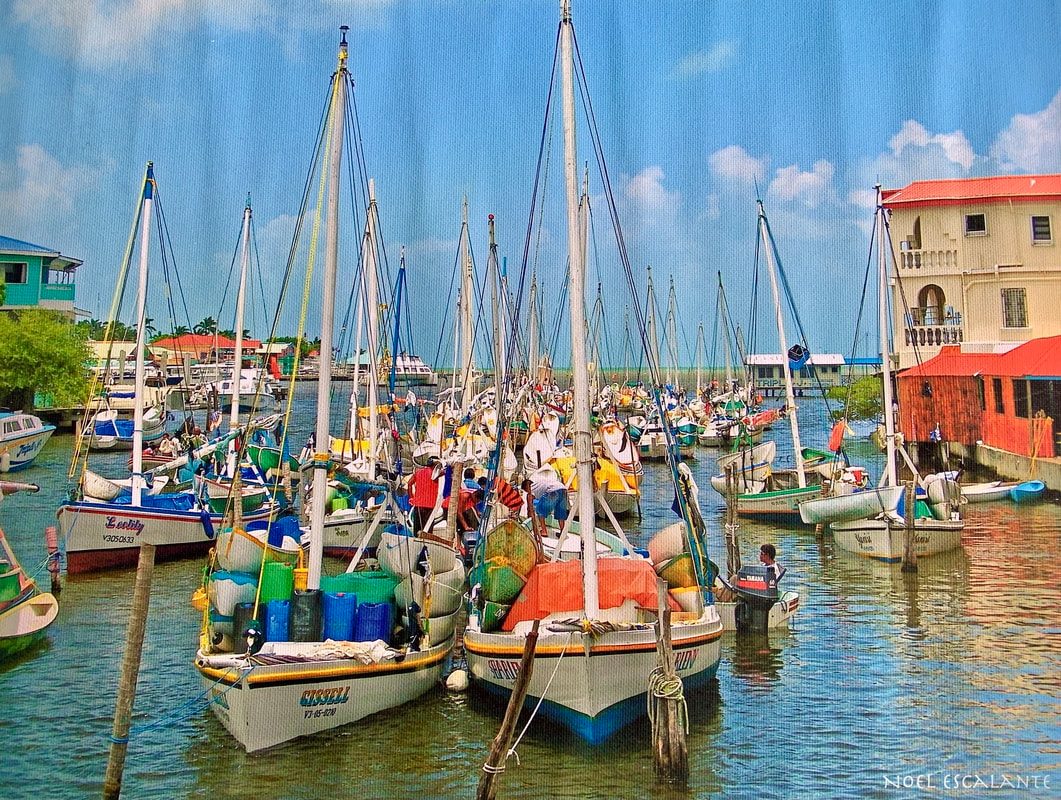Junglepixiebelize - Recollections of a Gringa Pioneer
Nancy R Koerner - Copyright@2021 - All Rights Reserved
CHAPTER FOUR
"In Living Color "
Finally breaking the frustrating pattern of right and left turns that had so-far taken us back to the exact same place four times, we finally ended up somewhere different. Crossing a bridge at Haulover Creek, if the sign was correct, it took us to what I assumed was the western half of Belize City. Again, every turn seemed wrong, and I began to feel like a rat-in-a-maze with no cheese at the end. And then, wonder of wonders, we ended up at the foot of another bridge, and in front of a restaurant named Mom’s. (Ahhh…Mom’s.) We went into Mom’s, had a full meal of the national dish: rice-n-beans, stew-chicken with red recado, and a small amount of strangely-incongruous, non-tropical, potato salad on the side. (OK. Which nation had influenced this?) At last, replete with a real meal in our bellies, in addition to the conch fritters, we took in the sights and sounds of this strange new place.
This seemed to be the very heart of downtown Belize City. The old bridge was legendary, a true swing bridge that apparently pivoted in the middle twice a day at 5AM and 5PM to allow tall boats to pass out to sea, and up the river, respectively. There was a fish market which gave a whole new meaning to the word malodorous, a Chinese dry goods store named Augusto Quan, a charming town clock, and a park beyond the fish market, with about twenty taxis, where drivers leaned against their vehicles, smoked their cigarettes and chatted amiably.
Downtown was disparate and enigmatic. Earthy and shabby, with bright-colored beauty and character, of harmony and discord, lilting Caribbean voices and raw harsh dialect, of clang and clamor. The foul smell of open canals with small floating islands of organic filth, the growl of trucks and exhaust, the honking of impatient taxis, and the braying of mule reluctantly pulling a heavy cart, all seemed to somehow blend into the post-colonial, but slightly-decayed, charm of another era.
At the foot of the Swing Bridge next to the fish market stood an old man whose dark wrinkled face beamed with the pure inner light of a mystic. “Love of di Maasta,” he sang out, his arms wide. “To alla di Laud’s peepul! Love of di Maasta to yu!” Like some Old Testament prophet, he praised every single passerby with a wide toothy grin. “Love of di Maasta,” he sang out. “To alla di Laud’s peepul! Love of di Maasta to yu!” Humbly, I bowed my head to receive my own blessing and, indeed, felt some intangible energy pass straight into my heart. For years afterwards, with every trip to Belize City, I looked for and found this iconic figure, always there at the foot of the Swing Bridge, always blessing the multitudes, at any-and-all-times of day. It was the story of the loaves-and-fishes, but with a Caribbean twist – the “loaves” being his proverbial blessings, and the “fishes” piled high in the stalls of the marketplace.
Standing now in the center of the Swing Bridge, my baby on my hip, I took in the magnificent sight of the colorful fishing boats that spread orange and blue, red, green, and yellow across Haulover Creek from east to west. Their decks were stacked high with goods, cans and barrels, cartons, boxes, and packages being loaded and unloaded. The sweating boat boys bantered back-and-forth, and laughed. “No rass!” I heard one say. “Waat? Yu di tink so, bwai?” replied the other. At the time, the Kriol language was a mystery, but the camaraderie was unmistakable.
We talked to people as best we could, finding that Belizeans could actually understand us just fine, and most could speak English perfectly well, if not with diverse vocabulary, fine nuance, or flourish. We also found out, through time, that Kriol was a tool well-used used to feign ignorance when it suited city-dwellers to be cliquish within their own culture. They could instantly turn on “di raw, broad one” whenever they chose to be evasive. After all, why else had Kriol evolved? It was a perfect way to confound the white man by speaking his own language in a way that he, himself, could not understand.
Our next task was to find out which direction would hold our destiny. It would not be in the north, we knew, so it would either be west or south. That is, if we could ever find the cheese…

